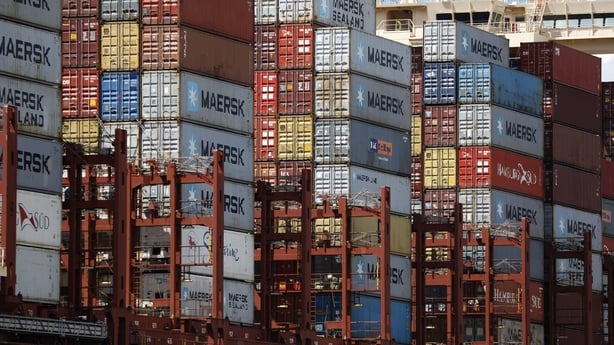The Minister for Integration has confirmed that the Cabinet decided to increase by €75 the weekly payments for asylum seekers who are not offered accommodation.
Roderic O'Gorman acknowledged that as of yesterday Government was not in a position to provide accommodation for everybody.
He said this is despite having added a very significant amount of international protection accommodation over the last year, with more than 10,000 additional spaces provided.
The existing expenses allowance of €38.50 is being increased by €75 to enable international protection applicants provide some supports for themselves while they are not being accommodated, the minister said.
The additional €75 "will be available for as long as someone is without an offer of accommodation" he said, but it will cease once they have been given accommodation.
Cabinet agrees €6m fund to aid local media
The Cabinet has decided that a fund of €6m will be allocated to aid local newspapers and radio stations.
In the Dáil this afternoon, Taoiseach Leo Varadkar said the Cabinet agreed to a local democracy reporting fund and a courts reporting fund.
He said the support would be made available next year after it is sanctioned by the European Commission.
He added that Minister for Medi, Catherine Martin and the regulator Coimisiún na Meán were working on the proposal.
The Taoiseach said he hoped the fund would be available to local media by the time local and European elections are held in June.
He added: "It is part of wider reform of TV licence fee."
Mr Varadkar said public service broadcasting was not just provided by RTÉ but also by local newspapers and radio.
Extradition negotiations with UAE
Earlier, Minister for Justice Helen McEntee told the Cabinet that where criminals are hiding out in the UAE, gardaí need to bring them back to Ireland where they can face charges for the crimes they have committed.
Minister McEntee also told her colleagues that it was important that criminals see there can be no hiding place from the law, and that the State will do everything in its power to bring those who spread misery in our communities to justice.
A number of other EU member states already have bilateral mutual legal assistance and extradition treaties in place with the UAE.
Ireland will be able to draw on the knowledge and experiences of EU partners regarding negotiations and international co-operation with the UAE in these matters.
The experience of EU partners has been that bilateral cooperation on existing individual cases can continue on a reciprocal basis while the treaties are being negotiated.
SME grants
The Minister for Enterprise, Trade and Employment brought details to the Government of more than €250m in one-off grants to small and medium businesses.
Simon Coveney told his colleagues that ICOB (increased cost of business) grants, first announced in the Budget, will go to 143,000 businesses across the country.
The rates system has been used to identify qualifying business in order to keep administration of the grants simple.
Businesses that paid up to €10,000 in rates will receive a grant equivalent to a 50% return. Businesses who paid between €10,000 to €30,000 will get a payment of €5,000 each.
The total budget for the scheme will be €257m and the payments will be made in the new year.

Tánaiste Micheál Martin and Minister for Agriculture Charlie McConalogue updated the Government on work to ensure Irish exporters step up preparations ahead of the introduction of new British import requirements.
On 31 January 2024, Britain is due to introduce the first phase of its much delayed post-Brexit import controls.
The new controls will pose logistical challenges for Irish exporters, especially in the agri-food sector.
The UK remains a key market for Ireland's agri-food sector, with exports to Britain in 2022 worth €6.8 billion, representing 36% of total food exports.
From the end of January, Irish exporters will need to lodge UK customs declarations for all goods exports and provide export certificates for some agri-foods.
Minister for Housing Darragh O'Brien updated ministers on the action plan for An Bord Pleanála.
The plan aims to restore public confidence in An Bord Pleanála.
There is now a new code of conduct for board members and staff, and more people work at the planning authority than at any time previously.
Since October 2021, 117 new staffing posts were sanctioned.
Additional reporting David Murphy







